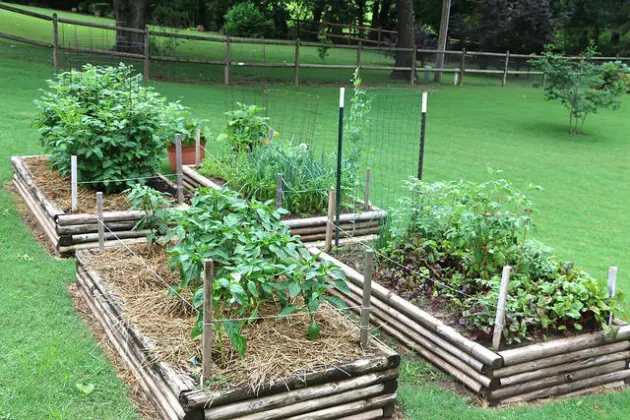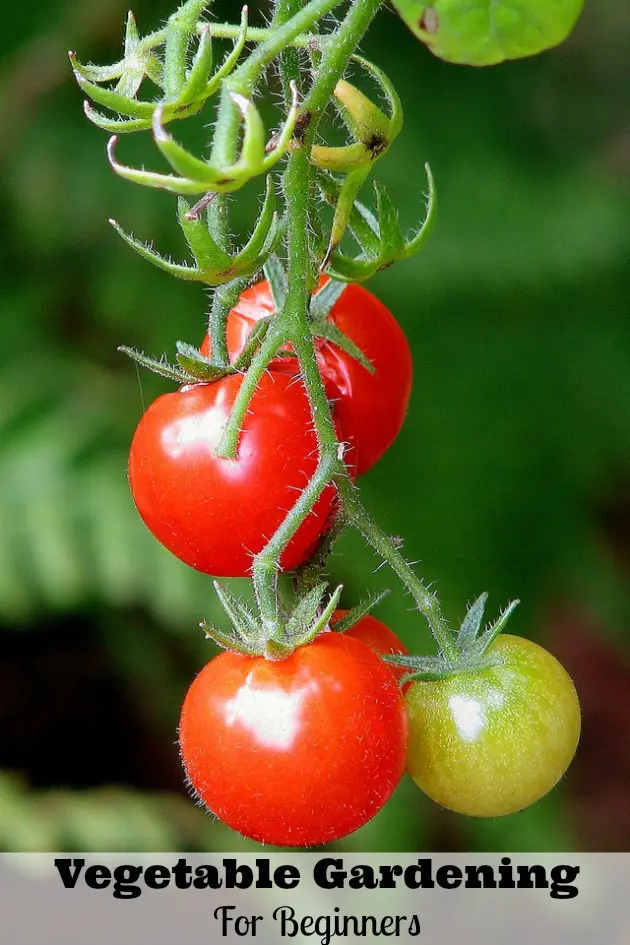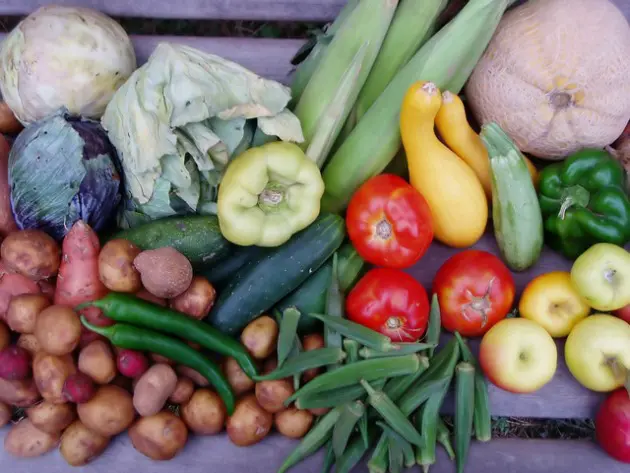Do you love the idea of growing your own organic vegetables but unsure on how to get started? Well then take a look at my top 10 tips to have you planting peppers, picking tomatoes, and be a gardening hub of information in no time. Vegetable gardening for beginners can seem daunting but you can do it with these simple tips. This blog post will provide beginners with essential tips and tricks for starting their own vegetable garden. Learn how to choose the right location, prepare the soil, select the best vegetables to grow, and maintain your garden to ensure a bountiful harvest.
Gardening For Beginners: 10 Tips To Start Off Right

Transform your meals by growing your own vegetables with the help of this beginner’s guide. Learn how to cultivate a variety of vegetables, from tomatoes to peppers. If it is early spring and you want to be a new gardener, go for it. You learn as you go and it feels great to enjoy fresh veggies from your own garden.
Avoid trees
My first advice about vegetable gardening for beginners is don’t put your vegetable garden near trees! The large roots soak up the majority of the nutrition from the soil and shade your vegetables, which need at least 6-8 hours of full sun. Additionally, to optimize sun exposure, plant your rows running north to south, with the shortest crops at the front to avoiding shadowing as they grow.
Start off with a small plot
Choose a location with well-draining soil. Make sure your garden is easily accessible for regular watering, weeding, and harvesting. A small plot of land is always a better choice for beginners as it’s more manageable. A plot of 4×4 feet or a few raised beds is a good size for beginners. Raised bed gardening is very trendy these days. I personally think it is harder to keep raised beds well hydrated and more costly to fill with good soil. I would opt against them for your small garden unless you have a health considerations and find bending over hard.
A 16×20 ft plot is about the maximum size you want to start with and you don’t want to planted too many different types of vegetables. Focus your attention on a small assortment of veg and you will prosper even with a limited knowledge of gardening.
Easy-to-grow vegetables
Another important tip about vegetable gardening for beginners is to select easy-to-grow vegetables for your first attempt, such as tomatoes, cucumbers, squash, peppers and cabbage. Some food crops may grow better than others in your garden, so it’s advisable to check soil quality, climate and weather before planting anything. Herbs can be grown in an indoor window garden so they are available year round. Your local independent garden center can help you determine what grows best in your area.
Tooled up
Make sure you have all the necessary tools at your disposal. These include garden gloves, spading fork, rake, roe, hand cultivator, garden hose, shovel and wheel barrow. If you need basic tools, look for them at garage sales or flea markets. Don’t go overboard by buying tools such as roto-tillers that are better off rented. These can easily drive the cost of your garden up. Better yet, look into the various methods of “no-till” gardening to save work, time, and money.
Test your soil
Test your soil and make soil amendments if it doesn’t have the ideal PH and primary nutrients. First time gardeners need to know the composition of their soil so they can know if it needs fertilizer and other nutrients to it. For example, f you have a high clay content soil, you may want to add sand for drainage and organic matter to enrich it. Soil testing kits are readily available at your nursery or garden center and will easily help you determine the particular type of soil you may have. Then you will know just what your soil may be lacking to make it as fertile as possible. Garden soil preparation is essential to getting a high garden yield.
Check frost dates
Customize your planting dates according to your local frost dates. Research the first and last frost date in your area if you’re not planting in a warm green house. If you aren’t getting an early start, skip seeds and go straight for the plant starts. Some vegetables, like tomatoes and peppers, are best started as transplants.
Weeding
Remove weeds and other debris before sowing seeds. Keep garden weeds down by spreading a 1-2 inch layer of mulch (untreated by pesticides or fertilizers) around each plant. This will also help keep the weeds down.
Alternatively, you can prevent garden weeds and not waste any time weeding with this trick. Line between garden rows with brown cardboard boxes broken down flat with staples and tape removed. The worms love it, when it rains the cardboard gets very wet and retains moisture. Great for weed control. Just be sure they are plain brown boxes not waxy boxes.
Watering – not too much, not too little
Water your garden at least 1 inch of water per week; more during hot spells or particularly winding periods. However, don’t over water your plants and drown the roots as this will kill the crop. Here are some more detailed watering tips!
Humanely repel insects
To repel insects, one humane method is to grow vegetables with strong smells, such as garlic, onion and chive. This is called companion planting. Furthermore, remember to remove over mature crops as they may attract some pests.
Involve the family!
Gardening should be a family activity which everyone can get involved in! Have kids plant their first seed and watch their surprise when they pull it out of the ground fully grown! Feed your plants with a balanced fertilizer, following the instructions on the package. Organic options like compost or fish emulsion are great choices. Regular harvesting encourages plants to produce more. For example, picking beans and zucchini often can lead to more produce.
With the right preparation, planting your own vegetable garden is straight forward and extremely fulfilling when it’s time to harvest your crop. A meal made from your own home-grown produce tastes just that little bit better in my opinion!
5 More Beginners Vegetable Gardening Tips
1. Have a plan and a budget. The easiest way to overspend is to go into the garden center without a plan. Before you know it, you’ve spent $100 on 42 tomato plants, 29 packets of seeds, and those cute pink garden gloves.
2. Mulch with materials from your home. Newspapers, grass clippings, and last year’s leaves all make great mulches to help hold moisture and keep weeds to a minimum.
3. Plant in succession. Don’t plant crops such as lettuce, green beans, and other short growing period crops all at once. Plant some every week or so that there is always a fresh crop ready to pick.
4. Follow the season. Cool weather crops such as broccoli, cabbage and spinach don’t like the heat of July and August. Plant these so that they are maturing in spring and fall for the best results.
5. Make your own compost. Save any plant matter such as leaves, grass clippings, and kitchen waste (vegetable trimmings, coffee grounds, egg shells, etc.). Compost does wonderful things for your garden’s soil.
Conclusion
By staying on top of maintenance tasks and giving your vegetable garden the care it needs, you’ll be well on your way to a successful harvest. Keep up with these practices throughout the growing season to ensure your plants stay healthy and productive. With a little time and effort, you’ll be rewarded with a bountiful harvest of fresh, homegrown vegetables to enjoy.,
Growing your first vegetable garden doesn’t have to be a daunting task. By carefully selecting the right location, preparing the soil, choosing the best vegetables to grow, and maintaining your garden with dedication, you can enjoy a successful harvest without killing everything in sight. Remember to start small, embrace the learning process, and savor the rewards of your hard work. As the saying goes, “The best time to plant a tree was 20 years ago. The second best time is now.” So, roll up your sleeves, get your hands dirty, and start cultivating your own little piece of paradise. Happy gardening!
I hope you found these tips on vegetable gardening for beginners helpful. Have you tried a vegetable garden before? Do you think you will give a vegetable garden a go this year?
Related Posts:



Louise Boyle says
Lovely and very helpful tips! My sister just started her first vegetable garden and I’m sure she’ll be very glad to have your ideas in mind for her small space. Definitely recommending this post to her and to some other beginner gardener friends too. Thank you for sharing all this nice info!
La Habra Fence Company says
These 10 wonderful tips are definitely going to help a beginner make an in-ground garden. By using these tips you can really have a successful vegetable garden into the late summer.
lsiah says
Valuable info to grow healthy plants. I have started some of the easiest vegetables in a container garden in a sunny spot on my porch. I bookmarked this gardening advice to refer back to. Thanks!